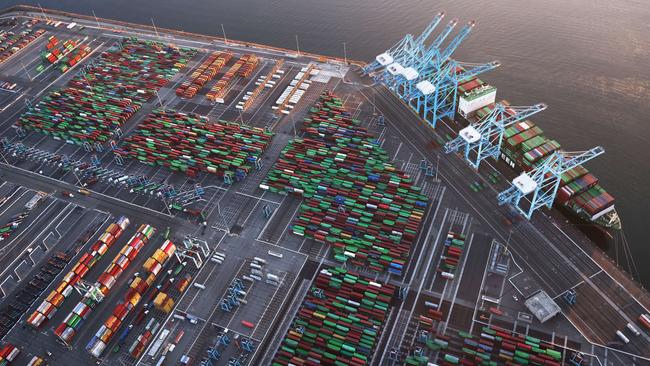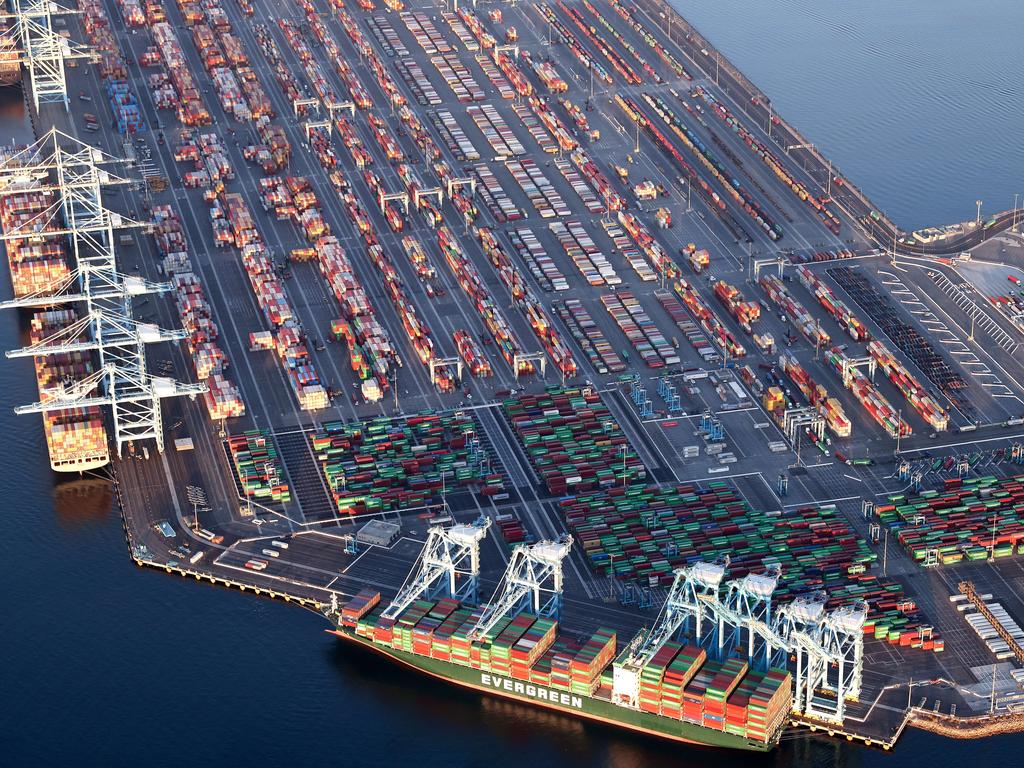Supply chain shock delays global economic recovery

For many businesses it is painfully clear that international trade is far from shipshape. Worst hit are exporters of perishable goods like chilled meat.
“On multiple levels, this whole logistics thing has become a real nightmare,” says Jon Condon, who runs the Beef Central website. “This lack of boats, lack of suitable refrigerated containers. There is even a lack of pallets, believe it or not, just the ordinary pallet they stack cartons on, because of this worldwide wood shortage.”
The timing could not be worse for Australian meat processors like JBS or Teys. They already make a loss on every trade. After drought reduced the national beef herd to 35-year lows, cattle prices are the most expensive of all major beef exporters in the world. “It’s a $300-a-head loss on every beast,” says Condon. “Processors are under enormous pressure and some may have to strategically close as a result.”
Around the world transport is failing, costs are soaring and ports shut down overnight from outbreaks or power cuts. In Britain supply chain problems threaten of a winter of discontent.
In Australia Condon says exporters who were charged $4000 a shipping container just a few months ago are now paying between $8000 and $11,000. But it is not just cost. The slowdown in delivery of perishable goods makes exporting a much riskier business.
“It’s been horrible,” says Stewart Hanna, who heads the Australian export office for Canadian business Sure Good Foods. “It’s hard to get product out of Australia. In some cases these vessels would have done pick-ups out of Sydney and Brisbane. Now they are saying ‘we only do one pick-up. Either you send product to Sydney or it doesn’t get on the boat’.”
Stewart Hanna is a non-packer exporter. The business doesn’t own abattoirs but buys meat out of the market to on-sell to customers. So he too is paying top prices. “I’m in meat export and the whole planning around deliveries is next to impossible – to the point where on some things I’ve just had to say I can’t do it.”
Big customers like supermarkets in the US or China demand product with a three-week shelf life. “You can’t do it because at the moment there is a couple of weeks’ delay getting containers, and then getting it on a vessel. Because the shipping lines are chasing the best dollar, they might go via a destination that they wouldn’t normally go to and then when you get to your destination, there are more problems,” says Hanna.
Ports in China and in the US face huge backlogs. In Los Angeles, between 70 and 80 container vessels were recently reported to be sitting off the coast, waiting to unload.
Global AgriTrends’ Simon Quilty is watching a constantly increasing cost in the supply chain and says the vulnerable part of the market is chilled. “Right now it is taking on the 21 days to clear west coast, Houston is 30 days, Philadelphia 17 days. We only get eight free days in terms of the containers.” According to Quilty, that means currently every 40 foot container is costing thousands of dollars extra to deliver: an extra $US4500 ($6200) to Philadelphia, $US6500 into LA, and a staggering extra $US11,000 into Houston.
Quilty says Australian chilled beef exports into China have been dire.
“It’s now taking six to eight weeks for a product to be cleared in China. We have had a 21 per cent fall in the volume of chilled beef to China since July this year. That is because high-grade meat is so vulnerable.
“Every time China gets a case of Covid-19 anywhere near a port that whole city shuts down and that stops the flow of world cargo. It’s their exports as well, all the trinket things for us at Christmas,” says Hanna. In Australia, the Port of Melbourne last week also delayed all shipments to the east coast of the US due to an outbreak at the Port.
China’s recent power cuts brought delays and Quilty sees the tense political relations adding to the problem.
“There is no doubt with China that Australia’s product is put to the back of the line but we’ve also got a slowness of entry into Korea, Japan and North America.” It seems incredible that meat processors already making a $300-a-head loss on their business are game to continue.
Jon Condon says it is because they have so much invested in their future. “They spend a lot of money developing branded beef programs for quality beef, they establish long-term trading relationships with customers overseas, and these customers want product 24/7 and 365 days a year. Processors are prepared to take very substantial losses that are almost unprecedented.”
There is also an imperative to preserve jobs in an industry already struggling to find labour. “If meat processors say tomorrow we need to stop slaughtering cattle until conditions improve, all those skilled and semi-skilled workers that are in their meat plants disappear. They go and work at a car yard or something. When they try to reactivate these plants in three or six months’ time, they are just not there,” Condon says.
Hanna agrees: “It’s a hard industry and if you’ve got good people, you need to keep them,” he says.
“It shows commitment to those people and their customers and those supply chains as well, when they are losing $300 a head.”
The world woke up to the fragility of global supply chains in March when the 400m Ever Given container ship became wedged in the Suez Canal, blocking 12 per cent of world trade valued at around $US9.6bn. Yet it is the comprehensive assault at every level of these supply chains that is proving so hard to manage.
Explanations for the shortage of containers and ships vary. “We understand during Covid-19 refrigerated containers were not being manufactured. There wasn’t much happening, so they just stopped producing containers and stopped producing container vessels,” says Condon.
Hanna argues that pandemic aside, the problem is that in recent years, freight has been very cheap. “That has meant shipping lines haven’t reinvested back into their business and their business is containers and building new boats. They haven’t been making money and they haven’t reinvested.”
Quilty says the huge amount of global trade between China and America is further restricting the use of 40 foot containers elsewhere.
Freight costs from India into North America have risen sixfold in a year, from $3000 to $18,000.
For Australia the problems look so grim that even the latest industrial action at ports is seen as marginal for exporters.
“The underlying problems are far more significant than any short-term strike action,” says Hanna. “Sure it’s not going to help, it will create further delays, but really they were in a world of pain already.”
Says Quilty: “Compared to the eight to 12 week delay getting product into China, it’s not significant but nonetheless it compounds the problems we are all experiencing.”







One legacy of Covid-19 is that economic recovery is a global repair job.